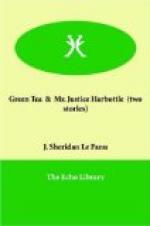“I’ll try,” said Judge Harbottle, not raising his eyes from the paper he was reading.
“I knew you’d do what I asked you,” she said.
The Judge clapt his gouty claw over his heart, and made her an ironical bow.
“What,” she asked, “will you do?”
“Hang him,” said the Judge with a chuckle.
“You don’t mean to; no, you don’t, my little man,” said she, surveying herself in a mirror on the wall.
“I’m d——d but I think you’re falling in love with your husband at last!” said Judge Harbottle.
“I’m blest but I think you’re growing jealous of him,” replied the lady with a laugh. “But no; he was always a bad one to me; I’ve done with him long ago.”
“And he with you, by George! When he took your fortune, and your spoons, and your ear-rings, he had all he wanted of you. He drove you from his house; and when he discovered you had made yourself comfortable, and found a good situation, he’d have taken your guineas, and your silver, and your ear-rings over again, and then allowed you half-a-dozen years more to make a new harvest for his mill. You don’t wish him good; if you say you do, you lie.”
She laughed a wicked, saucy laugh, and gave the terrible Rhadamanthus a playful tap on the chops.
“He wants me to send him money to fee a counsellor,” she said, while her eyes wandered over the pictures on the wall, and back again to the looking-glass; and certainly she did not look as if his jeopardy troubled her very much.
“Confound his impudence, the scoundrel!” thundered the old Judge, throwing himself back in his chair, as he used to do in furore on the bench, and the lines of his mouth looked brutal, and his eyes ready to leap from their sockets. “If you answer his letter from my house to please yourself, you’ll write your next from somebody else’s to please me. You understand, my pretty witch, I’ll not be pestered. Come, no pouting; whimpering won’t do. You don’t care a brass farthing for the villain, body or soul. You came here but to make a row. You are one of Mother Carey’s chickens; and where you come, the storm is up. Get you gone, baggage! get you gone!” he repeated, with a stamp; for a knock at the hall-door made her instantaneous disappearance indispensable.
I need hardly say that the venerable Hugh Peters did not appear again. The Judge never mentioned him. But oddly enough, considering how he laughed to scorn the weak invention which he had blown into dust at the very first puff, his white-wigged visitor and the conference in the dark front parlour were often in his memory.
His shrewd eye told him that allowing for change of tints and such disguises as the playhouse affords every night, the features of this false old man, who had turned out too hard for his tall footman, were identical with those of Lewis Pyneweck.
Judge Harbottle made his registrar call upon the crown solicitor, and tell him that there was a man in town who bore a wonderful resemblance to a prisoner in Shrewsbury jail named Lewis Pyneweck, and to make inquiry through the post forthwith whether any one was personating Pyneweck in prison and whether he had thus or otherwise made his escape.




